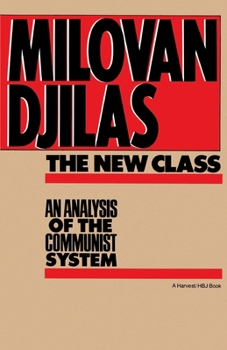Nova klasa
Select Format
Select Condition 
Book Overview
"The New Class" created a sensation was published in the United States in 1957, because it was the first time that a ranking Communist had publicly analyzed his disillusionment with the system. Djilas, a former associate of Tito's who had traveled from the lowest to the highest rung of the hierarchical ladder and who was imprisoned for his views, had found himself increasingly estranged from contemporary Communism and attracted to the idea of democratic socialism. Here, however, he puts aside the story of his personal evolution to write a detached, lucid, courageous critique of the Communist system: its roots, the character of its revolutions, the rise of its powerful political bureaucracy -- "the new class" -- in what was intended to be a classless society, its one-party state, its economic policies, and its tyranny over minds. Finally, Djilas examines the essence of the conflict between the U.S.S.R. and the West that continues to this day. In the present atmosphere of intensifying confrontation, The New Class is more significant than ever.
Format:Paperback
Language:English
ISBN:015665489X
ISBN13:9780156654890
Release Date:December 1982
Publisher:Houghton Mifflin
Length:228 Pages
Weight:0.53 lbs.
Dimensions:0.6" x 5.5" x 8.6"
Customer Reviews
3 ratings
One of the great books of the last half of the 20th century.
Published by Thriftbooks.com User , 17 years ago
Djilas was on of the top brass in Tito's Yugoslavia in the 50's and then he published this book, which was meant as a critique of where the Yougoslav Communist Party, and others, were going. The great thing about the books is that you can apply it to any particular power group and understand what is going on with them (I think it applies quite well to the corporate state as well as to the communist one). Quite an excellent read! Highest reccomendation!
The More Things Change..
Published by Thriftbooks.com User , 17 years ago
Djilas explains from firsthand experience how the CP went from being a revolutionary vanguard to the new ownership class in the societies that they created. They didn't own the factories, mines, and fields by law, but they became the defacto owners (i.e., enjoying the benefits of having control) of these productive assets. Perhaps the CP bigshots and their bureaucracy didn't own title to these assets but they certainly acted and benefited from being in control of them all the same. And given human nature, perhaps this is inevitable too. That was Djilas' point. Stalin, Mao, and Pol Pot just to name a few, all tried to prevent this but were unable to halt the evolution of the CP and it's bureaucracy into acting as a new ownership class. Look at the nominally Communist states that still exist: The so-called "People's Republic of China" is really a State-Capitalist enterprise; Orwell's Animal Farm as state policy. And Cuba and North Korea are simply monarchies under a nominally communist party. Witness the way Castro turned the State over to his brother Raul, and Kim Il-Sung turned control of N Korea to his son Kim Jong-Il. And for all his prescience Djilas spent years in Yugoslavian labor camps too. This critique is far more effective at exposing the fallacies and failures of Marxism-Leninism in practice than all the screeds written by the Cold Warriors back in the day.
The apogee of the bureaucracy
Published by Thriftbooks.com User , 20 years ago
Djilas' book written in the nineteen fifties was a real bombshell for the top of the CP's and in leftist circles in Europe. It exposed the communist countries as regimes ruled by a very small oligarchy of high level party members (sometimes by only one person, the party secretary). They were totalitarian dictatorial States. One bitter joke went around that the world's history could be summarized by three 'at' stages; matriarchat, patriarchat and secretariat. This small oligarchy built around itself a heavy State bureaucracy (later named the Nomenklatura), through which it controlled the whole country, politically through the one party system, economically through State monopolies and ideologically through an absolute control of the media. In fact, the masses were exploited with an iron fist.The Nomenklatura disposed of all the wealth. Everybody else had a job but lived in poverty. Djilas' book gives a cynical picture of the functioning of a totalitarian State with its corruption, its enormous differences in living standards and its complete resistance to change. For Djilas, communist regimes were slumbering civil wars between the government and the population. The government could only keep control by using physical (knocking down insurrections, incarceration and show trials) and ideological (censure) violence. Djilas also analyzes the role of Lenin and Stalin in the creation of this State bureaucracy. The Hungarian Nobel Prize winner Imre Kertesz defined the difference between fascism and communism as follows: fascism was a reality, communism a utopia, but both were characterized by the ruling of one party which wielded uncontrolled and unlimited power. Both were a disaster for the population. Djilas' book is the 'classic' about totalitarian bureaucracies. A must read, not only for historians.





